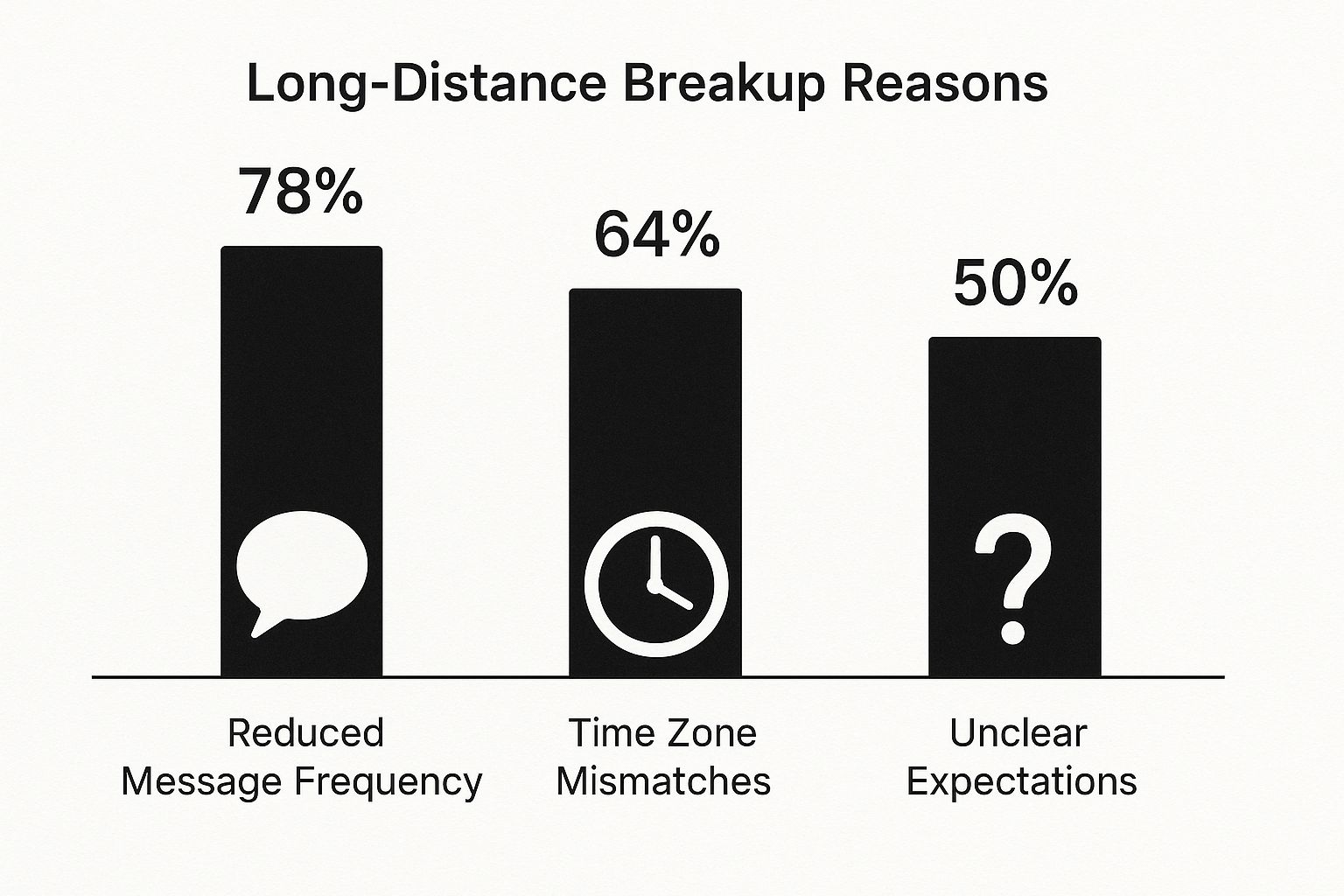Breaking up is never easy, but ending a long-distance relationship comes with its own unique set of heartaches. It often starts not with a bang, but with a quiet realization that the miles have carved out a space between you that love and late-night video calls just can't fill anymore. This isn't a personal failure; it's the painful reality for many couples stretched across cities and time zones.
Long-distance relationships are incredibly common—in fact, 58% of Americans have been in one at some point. And with studies showing around 60% of them succeed, it's easy to feel an immense pressure to make it work, to wonder if you're giving up too easily. It's so easy to get lost in a sea of 'what-ifs,' especially when we're surrounded by stories of love conquering all. You can get a clearer picture of these dynamics and read the full statistics on LDRs here.
Sometimes, the most crucial first step is simply acknowledging that the distance itself is the problem—not a fundamental flaw in you or your partner. That simple shift can move you from a place of blame to one of acceptance.
Common Reasons LDRs Hit a Breaking Point
The reasons a long-distance relationship ends usually simmer below the surface for a while. They’re rarely about one big, dramatic fight. Instead, they’re often slow-burning issues that are part and parcel of the LDR experience. Recognizing them might help you put your own feelings into words.
- Diverging Life Paths: Maybe you've realized your career is taking you one way while their family plans are pulling them in another. When neither of you can—or wants to—relocate, the future starts to look impossible.
- Emotional Exhaustion: The constant cycle of planning visits, juggling time zones, and living your relationship through a screen is draining. Over time, it can leave you with nothing left in the tank for a real, genuine connection.
- Fading Intimacy: Let's be honest, maintaining intimacy without physical presence is hard work. After a while, that spark can fade, and the connection might start to feel more like a great friendship than a romantic partnership.
- Unmet Needs: We all have core needs for support, spontaneity, and just being with someone. When the distance consistently leaves those needs unmet, resentment can quietly build up.
If any of this sounds painfully familiar, you're not alone. For those who are still trying to find ways to close that gap, our guide offers some helpful long distance relationship tips that could bring some clarity.
But if you know in your heart that the disconnect is permanent, the kindest thing you can do for both of you is to prepare for an honest, respectful conversation.
Getting Clear on Your Reasons Before You Talk

Before you even think about picking up the phone, the most important conversation you'll have is the one with yourself. Trust me, trying to start a breakup when you're not clear on your own feelings is a recipe for disaster. It's like trying to steer a ship in a storm without a compass—your emotions will yank you in every direction, and you'll end up sending mixed signals that only cause more confusion and pain.
This isn't about mentally listing all your partner's flaws. It's about getting to the heart of your own feelings so you can explain them with kindness and conviction. The real goal here is to figure out why this isn't working for you. When you can ground your decision in your own needs instead of blame, the conversation stops feeling like an attack and becomes more of a sad, but necessary, truth.
Pinpoint Your Core Reasons
Vague statements like, "I'm just not happy anymore," are nearly impossible for a partner to grasp. They leave the door open for arguments and confusion, which is the last thing you want. You need to dig a little deeper.
Grab a journal or just spend some quiet time with your thoughts. Ask yourself a few hard questions. The answers you find will be the bedrock for a much clearer, more compassionate conversation.
- What specific needs are going unmet? Is it the lack of physical presence? The inability to share small, everyday moments? Or maybe it's needing someone who can be there at a moment's notice, for the good and the bad?
- When did I really start to feel this way? Try to pinpoint when the disconnect began. Was it a gradual drift, or was there a specific moment, like a visit that felt strangely off?
- What does my future look like, and how does this relationship fit into it? This requires brutal honesty. If you see a future for yourself that's just not geographically compatible with your partner's plans, acknowledging that is a form of kindness.
The point of this soul-searching isn't to build a case to win an argument. It’s to anchor yourself in your own truth. That clarity will be what you hold onto when their emotional reaction makes you second-guess everything.
Anticipate Their Reaction with Empathy
Once you're solid on your reasons, it's time to prepare for their response. Breaking up with someone long-distance means you're delivering devastating news to a person you can't even offer a hug to. Their reaction could be anything—shock, anger, profound sadness, or just plain confusion.
Thinking about these potential reactions isn't about planning your counter-arguments. It’s about cultivating empathy. When you anticipate their pain, you can plan to respond with compassion while still holding firm to your decision. This emotional prep work is what allows you to stay calm and kind, preventing a really tough conversation from spiraling into a destructive one. You can be resolute without being cold.
Choosing the Most Respectful Way to Break Up
https://www.youtube.com/embed/gCfzeONu3Mo
Deciding how to deliver the news is often the most agonizing part of ending a long-distance relationship. The physical distance complicates an already painful situation, leaving you with a handful of imperfect options.
While firing off a quick text might seem like the easiest way to rip off the band-aid and avoid a tough conversation, it's almost always the most hurtful and disrespectful path. The goal here is to honor the connection you shared, even as it ends. That means choosing a method that allows for as much humanity, clarity, and compassion as possible.
Why a Video Call Is the Gold Standard
In a long-distance relationship, a video call is the closest you can get to a real, in-person conversation. And in this situation, that’s everything.
It lets you see each other’s facial expressions and body language, which are absolutely critical for conveying empathy and understanding tone. These non-verbal cues help prevent the kind of catastrophic misinterpretations that are so common over the phone or, even worse, via text.
Think about it: communication breakdowns are responsible for 40% of LDR failures. It makes sense, then, that the breakup itself should happen on the clearest channel available. Studies have shown that 62% of LDR couples rely on daily video calls to keep their bond strong. Using this same tool for the breakup acknowledges the seriousness of the conversation and provides a sense of respectful closure that other methods just can't match. You can discover more insights about LDR communication here.
Choosing video over a phone call or text isn't about making it easier for you; it's about showing respect for them. It demonstrates that you value them enough to face this difficult moment with as much presence as the distance allows.
When you're miles apart, deciding on the medium for the final conversation is a critical first step. Each option has its own weight and sends a different message.
Choosing Your Breakup Communication Method
Here’s a breakdown of the common methods for breaking up in an LDR, highlighting their respective pros and cons to help you make the most respectful choice.
| Method | Pros | Cons |
|---|---|---|
| Video Call | Allows for non-verbal cues, feels more personal and respectful, reduces misinterpretation. | Can be emotionally intense and confrontational. Requires scheduling. |
| Phone Call | More personal than text, allows for tone of voice, immediate back-and-forth. | Lacks visual cues, making it easier to misread emotions. Still feels impersonal. |
| Text/Email | Gives you time to craft your words carefully. Avoids direct confrontation. | Highly impersonal and disrespectful. High risk of being misinterpreted. Offers no real closure. |
Ultimately, a video call is the most humane option available for an LDR breakup, offering the closest thing to an in-person conversation and acknowledging the significance of the relationship you shared.
How to Schedule the Conversation
Timing and approach are everything. You can't just spring this on them during their lunch break or right before a big meeting at work. This conversation needs to be scheduled with care.
Send a simple, non-alarming message to set a time.
- Example Text: "Hey, can we schedule a video call sometime this week? There's something important I'd like to talk about with you. Let me know what time works best."
This message gives them a heads-up without immediately inducing panic. Be flexible and mindful of their schedule and time zone. If they press you on what it's about, it's best to be honest but gentle. You could say something like, "I think it’s better if we talk about it face-to-face on the call."
This infographic shows just how easily connections can fray over distance, which really underscores why having a clear, scheduled final conversation is so vital for respectful closure.

The data highlights the common friction points in LDRs, making that last conversation a critical moment to end things with dignity and clarity.
How to Navigate the Actual Breakup Conversation

Okay, this is it. The moment you've been mentally preparing for. The conversation itself can feel incredibly heavy, but if you approach it the right way, you can handle it with kindness, clarity, and respect.
Remember, your goal isn't to win an argument or prove a point. It's about communicating your decision honestly while still honoring the person you once cared for deeply.
The key to a compassionate breakup conversation is owning your feelings without pointing fingers. This is where "I" statements become your most powerful tool. They shift the focus from what you see as your partner's flaws to your own internal experience—and that's a truth they can't really argue with.
Using 'I' Statements for a Kinder Conversation
Instead of building a case around what they did or didn't do, root your explanation in your own emotions and needs. This simple switch in language can completely change the tone, turning a potential accusation into a much gentler revelation. It's the difference between an attack and just being honest.
Think about the difference here:
- Blaming Statement: "You never make time for me, and you obviously don't care about our future."
- 'I' Statement: "Lately, I've been feeling really disconnected, and I've come to realize that my vision for the future is different from what we've talked about."
See how the first one just begs for a defensive comeback? The second opens the door for a sad, but much more understanding, conversation about why you're no longer compatible. It's about the relationship dynamic, not their personal failures.
Your truth is valid. Stating it clearly using "I" statements isn't selfish; it's the most honest and respectful way to end things. This provides clarity and avoids the kind of ambiguity that can lead to false hope and make the pain drag on.
State Your Decision Gently but Firmly
When you deliver the news, be direct but soft. This is not the time for wishy-washy language like, "I think maybe we should take a break," if what you really mean is that it's over. That kind of ambiguity is cruel because it leaves the door open for misinterpretation.
Here are a few ways to say it that are both gentle and clear:
- "This is incredibly hard for me to say, but I’ve realized that I need to end our relationship."
- "After a lot of thought, I've come to the conclusion that this isn't working for me anymore, and I need to move on."
- "I really value you and what we had, but my feelings have changed, and I can't stay in this relationship."
Once you've said it, you don't need to over-explain or justify it over and over. Stick to your core reasons without getting dragged into a debate. Your decision is not up for negotiation.
Listen and Validate Their Feelings
After you’ve said your piece, the most important thing you can do is just listen. Your partner is going to have a reaction—sadness, anger, confusion—and they deserve the space to express it without being interrupted or corrected.
This doesn't mean you have to absorb endless blame or let them talk you out of your decision. It simply means validating their emotional experience. You can show empathy by saying things like:
- "I understand why you're so hurt and angry."
- "I can only imagine how difficult this is to hear."
- "I hear what you're saying, and I am so sorry for the pain this is causing you."
Listening respectfully is a final act of kindness. It shows that even though the romance is ending, you still see them as a person whose feelings matter.
Set Immediate Boundaries for Healing
To make the separation real for both of you, you need to establish some gentle but clear boundaries right away. The most effective boundary right after a breakup is a period of no contact.
Explain that you both need space to process everything and start healing. Suggesting this shows you're thinking about their well-being, not just your own. You could say something like, "I think it would be best for both of us if we take some time apart with no contact to start healing." This initial separation is essential for creating the clean break you both need to actually move forward.
Managing the Practical Side of Separating

Once the gut-wrenching breakup conversation is over, you’re left with the cold, hard logistics. This isn’t like a local breakup where you can just drop a box of stuff on a porch. A long-distance split means untangling two lives that are woven together across miles, both online and in the real world.
Tackling these practical details quickly is one of the kindest things you can do for yourself. If you let it drag on, every logistical snag becomes another opportunity for emotional pain and conflict. Think of this as more than just dealing with "stuff"—it's about reclaiming your own space, both physically and mentally.
It's a strange thing, but a lot of the anxiety in long-distance relationships is about the future. Research has found that 34% of LDR couples stress about whether their chemistry will still be there when they finally reunite. After a breakup, that anxiety just shifts. It becomes about the stress of taking apart a life you were supposed to be building. Having a clear plan to handle the details can really help quiet that noise so you can start to heal.
Creating a Logistical Separation Plan
A little structure goes a long way in preventing a messy, drawn-out process. Try to agree on a game plan for handling everything, from physical belongings to digital accounts, in one final logistical conversation.
Returning Personal Belongings
This is almost always the most awkward part. The goal here is to be fair and efficient, not to use someone's favorite hoodie as a bargaining chip.
- Set a Deadline: Pick a date to have everything shipped by. Two weeks is a pretty reasonable timeframe.
- Share Shipping Costs: The easiest and fairest way to do this is for each person to pay to ship the other person's items back to them.
- Handle Sentimental Items with Care: What if something is too fragile, valuable, or just plain huge to ship? Talk about alternatives. Maybe a mutual friend can hold onto it for a while, or you might just have to agree to let it go.
Managing Your Digital Life
In a long-distance relationship, your digital connection is often the deepest one you have. Untangling it is absolutely essential for your mental health and ability to move on.
Untangling your digital lives is a modern necessity for a clean break. It’s about removing the constant, small reminders that can reset your healing process back to day one.
Think about all the shared accounts: Netflix, Spotify, cloud storage for photos, maybe even joint gaming profiles. You need to decide who gets what and then remove the other person’s access. This isn't about being petty. It’s about creating the clean boundaries you both need to build separate lives.
Navigating Social Media and Mutual Friends
Finally, you have to deal with your public-facing connection. If you can, decide together how you'll handle the social media side of things. It can save a lot of drama with mutual friends down the line.
Changing your relationship status, unfollowing, or just muting them are all personal calls. Muting can be a good first step if unfollowing feels too harsh or final right away. It gives you the space you need to heal without making a big public statement.
For anyone who needs that space, getting a handle on the no contact rule can be a game-changer. It gives you a framework for creating distance so you can focus on yourself. If you're curious, you can learn more about the no contact rule in our detailed guide.
Healing and Reconnecting With Your Own Life
The silence after a long-distance relationship ends is a special kind of empty, isn't it? You're not just missing a person; you're grieving the loss of a whole routine built on late-night calls, constant messages, and plans for the future. That abrupt end to a daily digital connection can leave you feeling completely untethered in your own life.
Healing starts when you consciously shift your focus from the screen back to the world right in front of you. This is all about grounding yourself in your physical environment again and rediscovering what brings you joy in your immediate surroundings. It’s time to turn that energy inward and local.
Embrace Your Local Environment
The antidote to the loneliness created by distance? Your local community and friendships. Long-distance relationships can sometimes, without you even realizing it, isolate you from the people closest to you because all your social energy is being beamed miles away. Now is the perfect time to reinvest in those connections.
- Reconnect with friends you can actually see: Reach out to the friends you can grab a coffee with. Seriously, be honest about what you're going through and let them be your support system.
- Rediscover local hobbies: What about that yoga studio down the street you've been meaning to try? Or the farmer's market on Saturday mornings? Fill the time you once spent on calls with activities that genuinely connect you to your town.
- Explore your own backyard: Become a tourist in your own city for a day. Visit a museum you've never been to, find a new hiking trail, or finally try that restaurant you've had on your list forever. Creating new, positive memories in your physical space helps overwrite the old ones tied to the relationship.
Healing isn't about trying to erase the past. It’s about building a present so fulfilling that the past loses its power over your happiness. You're creating a life that feels whole, all on its own.
Reframe the Breakup as a Chapter
It’s so easy to see a breakup as a failure, especially when you invested so much hope and effort into making the distance work. But reframing the experience is absolutely crucial if you want to move forward with a sense of empowerment instead of defeat.
Think of it this way: this relationship was a significant chapter in your life, not the entire story. It taught you things about your own needs, your resilience, and what you truly want and need in a partner. It was a period of growth that has, in its own way, prepared you for whatever comes next. Letting go of the "what ifs" and "should have beens" is what allows you to appreciate the lessons you've learned.
Getting over a breakup is a unique journey for everyone, and our guide on how to get over a breakup offers more specific strategies to help you through this exact process.
Common Questions About Ending an LDR
Figuring out the end of any relationship is tough, but long-distance breakups come with their own unique set of logistical and emotional hurdles. Let's tackle some of the most common questions that pop up when you're facing this difficult conversation from afar.
Is It Okay To Break Up Over Video Call?
Absolutely. In a perfect world, every hard conversation would happen in person. But let's be realistic—that's often not possible or practical when you're miles apart.
A video call is the most respectful alternative you have. It's worlds better than a cold phone call or, worse, a text. Seeing each other's faces and reading body language adds a layer of empathy and humanity that's crucial for a conversation this heavy. Opting for video shows you value the person and the time you shared enough to face them as directly as you can.
What If They Refuse To Talk or Just Ghost Me?
This is a really painful possibility, and unfortunately, it happens. You can't force someone to have a conversation they're determined to avoid. If you've tried to schedule a call and they're either refusing or have just vanished, your priority has to shift to your own peace of mind.
At this point, you have to create your own closure. Send one final, clear message that states your decision. Something like, "Since I haven't been able to get ahold of you to talk, I need to be direct. I'm ending our relationship. I truly wish you the best." It’s not how you wanted it to go, but it draws a clear line in the sand, allowing you to start moving forward.
Your healing can't be held hostage by their avoidance. You have every right to declare the relationship over for yourself and begin to process it, even if they won't participate.
Can We Stay Friends After the Breakup?
The honest, unfiltered answer? Probably not, at least not for a while. The idea of transitioning seamlessly from partners to pals is a nice thought, but it's incredibly rare in practice.
Trying to jump straight into friendship usually just blurs the lines, keeps hope alive where it shouldn't be, and ultimately stops you both from properly healing. The kindest thing you can do for both of you is to have a clean break. Suggest a period of no contact for at least a few months. If a real, genuine friendship is meant to be, it might find its way back later, but only after you’ve both completely and truly moved on.
At Poke Match, we provide expert guidance to help you navigate complex relationship dynamics with clarity and confidence. Find more insights and practical advice by exploring our resources at https://poke-match.com.
